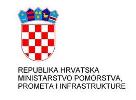Serbia and Croatia signed agreement on technical maintenance of the Danube
 Tuesday, 13.10.2009.
Tuesday, 13.10.2009.
 15:13
15:13
(the Danube)
Serbia and Croatia signed the Agreement today (October 13, 2009) on navigation, navigable ways on internal waters and their technical maintenance, which includes guidelines for maintenance of the Danube in the border area.
As it was explained at the press conference, that agreement defines the details of technical maintenance of about 130 kilometers of the Danube in the border area, as well as the navigation safety issue.
The Agreement was signed by the Minister of Infrastructure of Serbia, Milutin Mrkonjić, and the Minister of Sea, Turnover and Infrastructure of Croatia, Božidar Kalmeta, who heads the delegation of Croatian Ministry in the visit to Serbia.
Following the signing of the Agreement, Kalmeta said that the maintenance of the Danube had been "undefined" before, so that everybody "worked a little and, actually, nobody worked anything", which made "this waterway endangered".
He said that the Agreement "does not prejudice the border between Serbia and Croatia" on the territory of the Danube, which was not defined. He added that the problem of the border should be resolved, but not by the ministries of infrastructure because they were not authorized to do that.
Serbian Minister of Infrastructure's Assistant for Water Traffic, Pavle Galić, said that non-quality maintenance of water Corridor 7 had negative impact on the safety of navigation, and he added that there were several "critical sections" in the water current of the Danube between Serbia and Croatia.
- Especially "critical" is the section near Apatin, and great attention will be paid to it - said Galić.
The State Secretary of the Ministry of Turnover of Croatia, Branko Bačić, said that the Sava was much more neglected than the Danube and that large investments were required to satisfy the needs of the economies of four countries it passed through.
He said that he expected realization of the project for rehabilitation of the Sava, worth 85m EUR, to start in 2011, and he added that the Sava Committee, which comprised the representatives of Serbia, Croatia, Bosnia and Herzegovina, and Slovenia, was working on the project for rehabilitation and collecting of licenses for works.
- The project would be financed mainly by Serbia, Croatia and Bosnia and Herzegovina - said he and added that he expected the funds to be provided from European funds and the funds of international finance institutions.

 Izdanje Srbija
Izdanje Srbija Serbische Ausgabe
Serbische Ausgabe Izdanje BiH
Izdanje BiH Izdanje Crna Gora
Izdanje Crna Gora


 News
News








